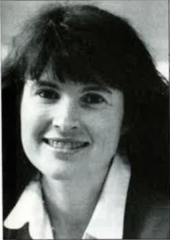
Mary Agnes Lynch
One of New York State’s most effective advocates and educators in the area of domestic violence and justice for people with disabilities, Mary Lynch takes fierce pride in her Irish heritage.
Her mother, Brigid Agnes McCarrick Lynch, was born in the village of Cloonacool, Co. Silgo, and emigrated to the United States in 1952. Mary’s father, Patrick Francis Lynch, described by Mary as “the vintage Kerry man,” was born in Tralee and emigrated to the States on Thanksgiving Day in 1953.
Lynch’s ancestors were very active in politics and worked on the railroad. In fact, her uncle, Mike Quill, founded the Transport Workers’ Union when he emigrated to the States. It is easy to see how this history of activism has influenced Lynch. She also credits her moral development to her Catholic education. Born in the Bronx, she attended Our Lady of Mercy and St. Frances de Chantel grammar schools and Cardinal Spellman High School, which she describes as intellectually stimulating and morally challenging. Throughout these years, she and her family were members of the Bronx Gaelic League. When Lynch went on to study politics and economics at New York University, she, together with Mary Catherine McGreal, founded the NYU Gaelic Society.
After graduating from NYU, Lynch went on to study at Harvard Law School where she took an active part in several pro bono projects. She returned to New York in 1985 and married Andrew “Rudy” Stegemoeller in 1987.
After working as a prosecutor in New York City, she went on to teach at Albany Law School.
Perhaps Lynch’s most high-profile case in New York State this year was the clemency petition on behalf of Charline Brundidge, a victim of seven years of domestic violence, who shot her husband after he had beat her and threatened to take her life. The case Lynch and her students built for her petition persuaded Governor Pataki to grant clemency to Brundidge, who had already served ten years of her sentence.
Lynch is currently the director of the Albany Law School Domestic Violence Project and previously acted as director of the Post-Conviction Remedies Clinic, where she instructed advocates who prepared clemency petitions for incarcerated battered women.
Lynch, a mother of two, says that her greatest professional joy is teaching and working with law school students who are eager to use their degree by giving back to the community and fighting for justice. “Their commitment to our clinic clients and to justice give me hope for the future of America,” she said.
